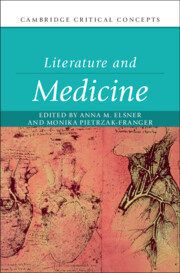Book contents
- Literature and Medicine
- Cambridge Critical Concepts
- Literature and Medicine
- Copyright page
- Dedication
- Contents
- Figures
- Contributors
- Acknowledgements
- Medico-Literary Pathways, Crossroads, and Side Streets
- Part I Origins: Histories
- Part II Developments: Forms
- Chapter 6 Illness and the ‘Fall’ of Language
- Chapter 7 Translating Chronic Pain and the Ethics of Reading in the Personal Essay
- Chapter 8 Physician-Poets and Vitalist Theories of Life
- Chapter 9 Healthcare Anecdotes and the Medically Anecdotal
- Chapter 10 Literary Realism and Mental Breakdown
- Chapter 11 Time and Narrative in the Age of Postnatural Death
- Chapter 12 Performance and/as Contagion in the Time of the COVID-19 Pandemic
- Chapter 13 The Parallel Chart as Medico-Literary Practice
- Chapter 14 Articulating the Experiential in Graphic Medicine
- Part III Applications: Politics
- Afterword
- Index
Chapter 7 - Translating Chronic Pain and the Ethics of Reading in the Personal Essay
from Part II - Developments: Forms
Published online by Cambridge University Press: 17 January 2024
- Literature and Medicine
- Cambridge Critical Concepts
- Literature and Medicine
- Copyright page
- Dedication
- Contents
- Figures
- Contributors
- Acknowledgements
- Medico-Literary Pathways, Crossroads, and Side Streets
- Part I Origins: Histories
- Part II Developments: Forms
- Chapter 6 Illness and the ‘Fall’ of Language
- Chapter 7 Translating Chronic Pain and the Ethics of Reading in the Personal Essay
- Chapter 8 Physician-Poets and Vitalist Theories of Life
- Chapter 9 Healthcare Anecdotes and the Medically Anecdotal
- Chapter 10 Literary Realism and Mental Breakdown
- Chapter 11 Time and Narrative in the Age of Postnatural Death
- Chapter 12 Performance and/as Contagion in the Time of the COVID-19 Pandemic
- Chapter 13 The Parallel Chart as Medico-Literary Practice
- Chapter 14 Articulating the Experiential in Graphic Medicine
- Part III Applications: Politics
- Afterword
- Index
Summary
Focusing on contemporary life writing of chronic pain, specifically lyric essays, this chapter explores the language of pain, refuting its untranslatability, and suggesting that creative forms and experimental expression are helping to develop language to meet experience. Recent illness narratives are building a common language with which to articulate their physical sensations, with Eula Biss’s ‘The Pain Scale’ (2005) encouraging a community of pain expression, and becoming a generative intertext. While pain sufferers reclaim their experiences, they are also reclaiming and renewing diagnostic vocabulary, for example through ‘subterfuge‘, which requires readers to better engage in attentive listening, with an ethical obligation not to overlook or mishear marginalized voices. Alongside Biss, this chapter explores the work of Amy Berkowitz, Molly McCully Brown, Anne Boyer, Sinéad Gleeson, Sonya Huber, and Lisa Olstein.
- Type
- Chapter
- Information
- Literature and Medicine , pp. 120 - 136Publisher: Cambridge University PressPrint publication year: 2024

